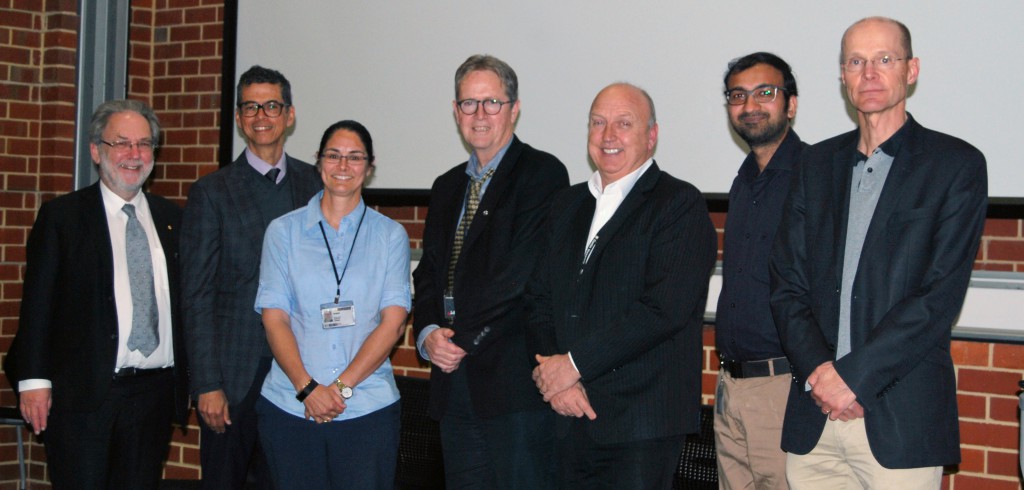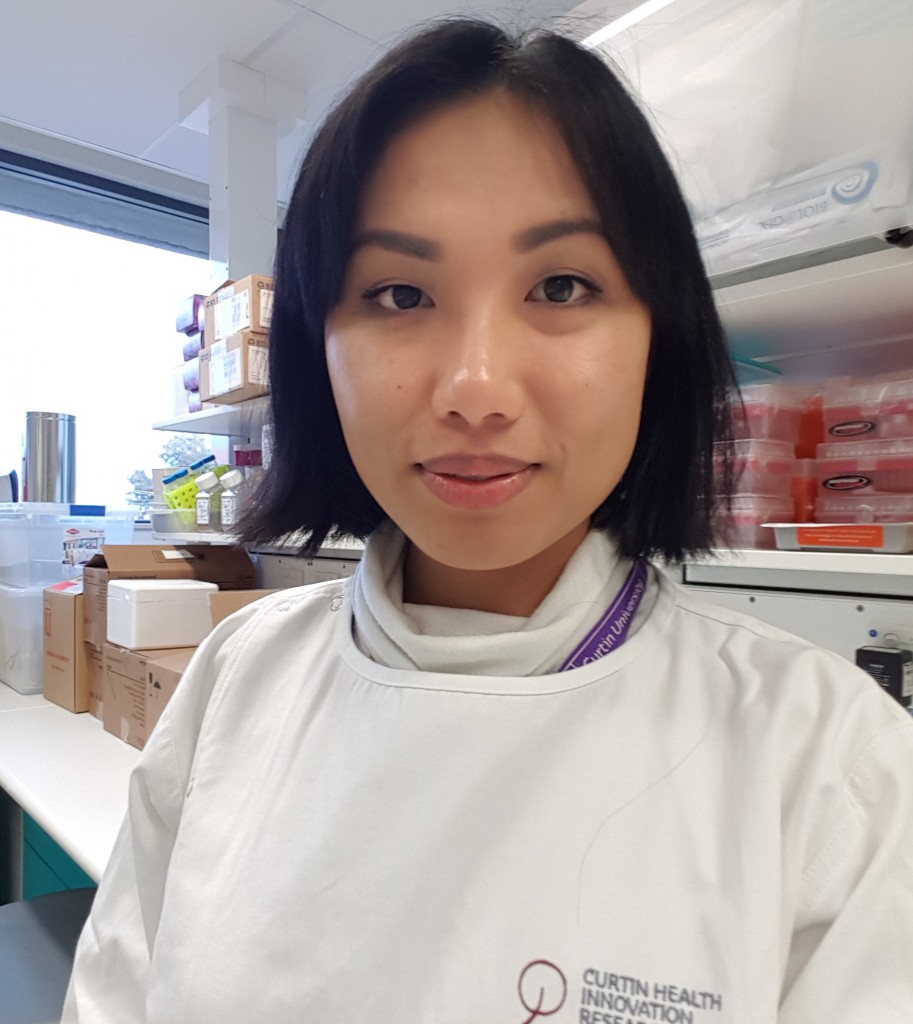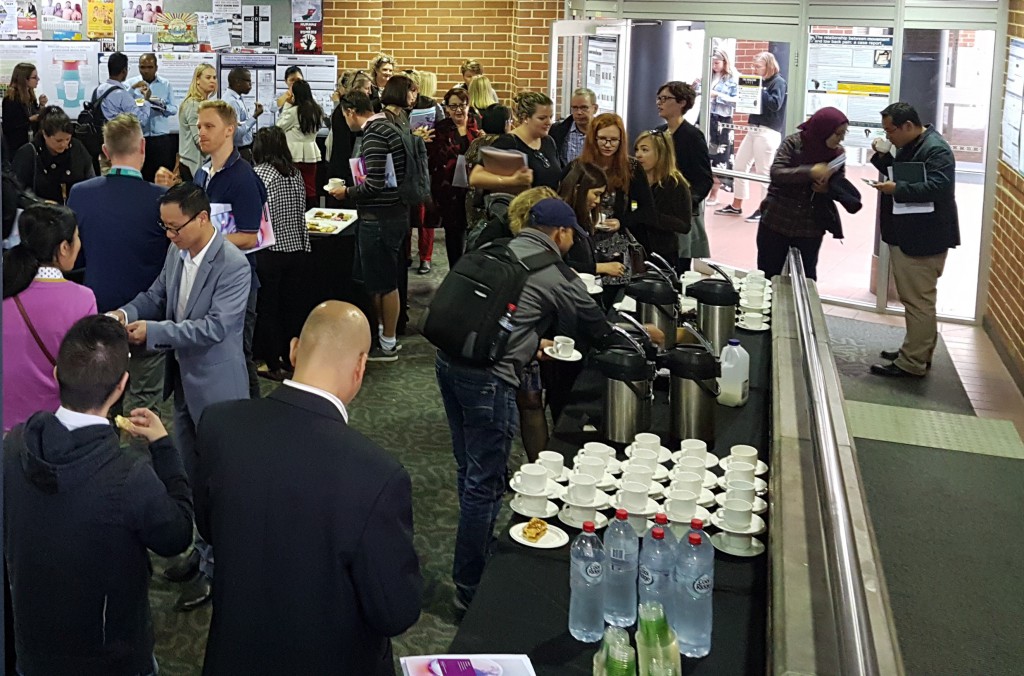
Prof. Mike Daube, A/Prof. Cyril Mamotte, Dr Elissa Burton, Prof. Christopher Reid, Prof. Garry Allison, Abhishek Kumar Singh and Prof. Torbjorn Falkmer.
Each year, Curtin University’s Faculty of Health Sciences pays tribute to a distinguished scholar and leader by showcasing the diverse and innovative research being undertaken by the Faculty’s doctoral and research masters students.
About 130 students and staff attended the Mark Liveris Student Research Seminar this year, including representatives from the Curtin Health Innovation Research Institute (CHIRI).
CHIRI researchers and students were involved in both the proceedings and some of the 77 poster and paper presentations held over the course of the day.
Associate Professor Cyril Mamotte (School of Pharmacy and Biomedical Sciences) welcomed guests and paid tribute to Emeritus Professor Mark Liveris OBE. An opening address by the faculty’s Dean of Research, Professor Torbjorn Falkmer, followed.
Researcher Professor Melinda Fitzgerald (CHIRI & Sarich Neuroscience Research Institute), presented an appreciative crowd with a stellar keynote address about her neurotrauma research. A second keynote address was given by recent Western Australian of the Year, Emeritus Professor Mike Daube.
John Curtin Distinguished Professor Christopher Reid (School of Public Health) and PhD student Abhishek Kumar Singh (School of Pharmacy and Biomedical Sciences/supervisor Dr Ross Graham), were part of an academic panel who discussed new trends in HDR education, followed by a Q&A session with the audience. The panel also included Associate Deputy Vice Chancellor – Research Training, Professor Garry Allison (Research Office at Curtin) and Senior Research Fellow Dr Elissa Burton (School of Physiotherapy and Exercise Science).
Nine students linked to CHIRI were recognised for their poster and paper presentations.
CHIRI award winners
Best Poster Presentation Room 2
1st place – Ola Gozt (School of Pharmacy and Biomedical Sciences/supervisor Professor Melinda Fitzgerald)
Ola’s research poster was on ‘Developing an Evidence-Based Suite for Predicting Outcome following Concussion’.
2nd place (tie) – Aikaterini Emmanouilidi (School of Pharmacy and Biomedical Sciences/supervisor Professor Marco Falasca) and Tenielle George (School of Pharmacy and Biomedical Sciences/supervisors Dr Danielle Dye and Professor Deirdre Coombe)
Aikaterini’s research poster was on ‘Exploiting lipidomics to unravel novel biomarkers for pancreatic cancer’, while Tenielle’s was on ‘Investigating the roles and regulation of melanoma cell adhesion molecule (MCAM) ectodomain shedding in melanoma’.
Best Poster Presentation Room 3
1st place – Nikita Walz (School of Pharmacy and Biomedical Sciences/supervisor Professor Philip Newsholme)
Nikita’s research poster was on ‘An In Vivo and In vitro Examination of Vitamin D in Human fertility’.
2nd place (tie) – Huong Ho (School of Public Health/supervisor Professor Gary Dykes) and Silvano Paternoster (School of Pharmacy and Biomedical Sciences/supervisor Professor Marco Falasca)
Huong’s research poster was on ‘The use of lactic acid bacteria biofilms to exclude foodborne pathogens on the food processing surfaces’, while Silvano’s was on ‘Lysophosphatidylinositol-mimics as novel treatment anti-diabetic drugs’.
Best Paper Room 1
1st place – Amreeta Sarjit (School of Public Health/supervisor Professor Gary Dykes (School of Public Health), co-supervisor Dr Ranil Coorey (School of Molecular and Life Sciences), A/supervisors Dr Joshua Ravensdale (School of Public Health) and Dr Narelle Fegan (CSIRO, Agriculture and Food))
Amreeta’s paper was about salmonella, a major food-borne pathogen of significant public health concern. Her research is investigating salmonella’s response to heat and pH in red meat juice to find ways to decrease salmonella-associated infections.
Best Paper Room 3
1st place – Lelinh Duong (School of Pharmacy and Biomedical Sciences/supervisor Dr Connie Jackaman)
2nd place – Shelley Waters (School of Pharmacy and Biomedical Sciences/supervisor A/Professor Patricia Price)
Lelinh’s research paper was about how immune cells called macrophages become more tumour promoting with old age and how Akt and the mammalian target for rapamycin signalling pathways may be involved. Shelly’s research paper was entitled ‘Gift of the Gob: Exploring the meaning of detecting human cytomegalovirus in saliva’. Cytomegalovirus infections are associated with cardiovascular disease in elderly patients.
Congratulations to the organisers and award winners who contributed to the event’s success.



